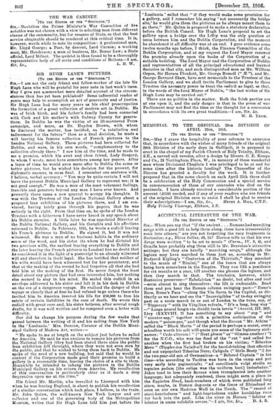ACCIDENTAL LITERA111{E OF THE WAR.
(To THE EDITOR OP THE " SPECTATOR.")
Sre,—When you say that "if the ancient . . . Romans had marching songs with a good lilt to help them along, these have irrecoverably sunk into silence," are you not forgetting the racy fragments in Suetonius; e.g., Dimas 'alias, 49, 51? Horace tells us that his own Songs were written " to be set to music " (Cars.., 1V. 9, 4), and Oundle boys probably sing them still to Mr. Brereton's attractive settings; but they are hardly " marching songs," although the legions may have marched to them just as, according to Mr. Rudyard Kipling's " Centurion of the Thirtieth," they marched to the music of "Rimini," one of the tunes that are always being born somewhere in the Empire. They run like a pestilence for six months or a year, till another one pleases the legions, and then they march to that. The trochaics, however, which Suetonius preserves—" Rabelaisian" no doubt, but alive and real —seem almost to sing themselves: the lilt is undeniable. Read them and you hear the Roman column swinging past—" Rome's Race, Rome's Pace "—along the Via Sacra to the Capitol, as dis- tinctly as we hear and see the " Incorrigibles " of to-day swinging past on a route march in or out of London to the tune, say, of " Tipperary " with its Virgilian refrain, " It's a long, long way " —"Longa procul longis via dividit invia terris " (.4eneid, III 383). Livy (XXXVIII. 7) has something to say about " sap " and " counter-sap," together with a primitive anticipation of the modern " poison-gas," and though what the Roman." Mr. Atkins called the " Black Maria " of the period is perhaps a secret, every schoolboy worth his salt will quote you some of the legionary nick- names: " Cedo alteram! " ("Next please" or "Gimme another ! ") for the N.C.O., who was too fond of the " cat" and called for another when the first had broken on his victim; "Biherius Hero " (Tippler-ins Ne(a)t-o?) for the hard-drinking (but effective and not unpopular) Tiberius Nero; Caligula (" little Booty "!) for the two-year-old son of Germanicus—a " Beloved Captain " in his time—who according to Tacitus was born in the camp and put very early into regimentals; " ad concilianda vulgi studia eo tegmine pedum [the caliga was the uniform boot] induebatur." Jokes tend to lose their flavour when transplanted into another language; but adequately rendered, these might earn a place in the Egginton Howl, back-numbers of which were published long since, maybe, in Roman dug-outs or the limes of Rhineland or even on our own Hadrian Wall in the North. The " record of stout-heartedness " and light-heartedness tinder hardships runs far back into the past. Like the river in Horace " labitur et
lubetur in omne voliibilis aevum."—I am, Sir, &c., D. A. S.


































 Previous page
Previous page